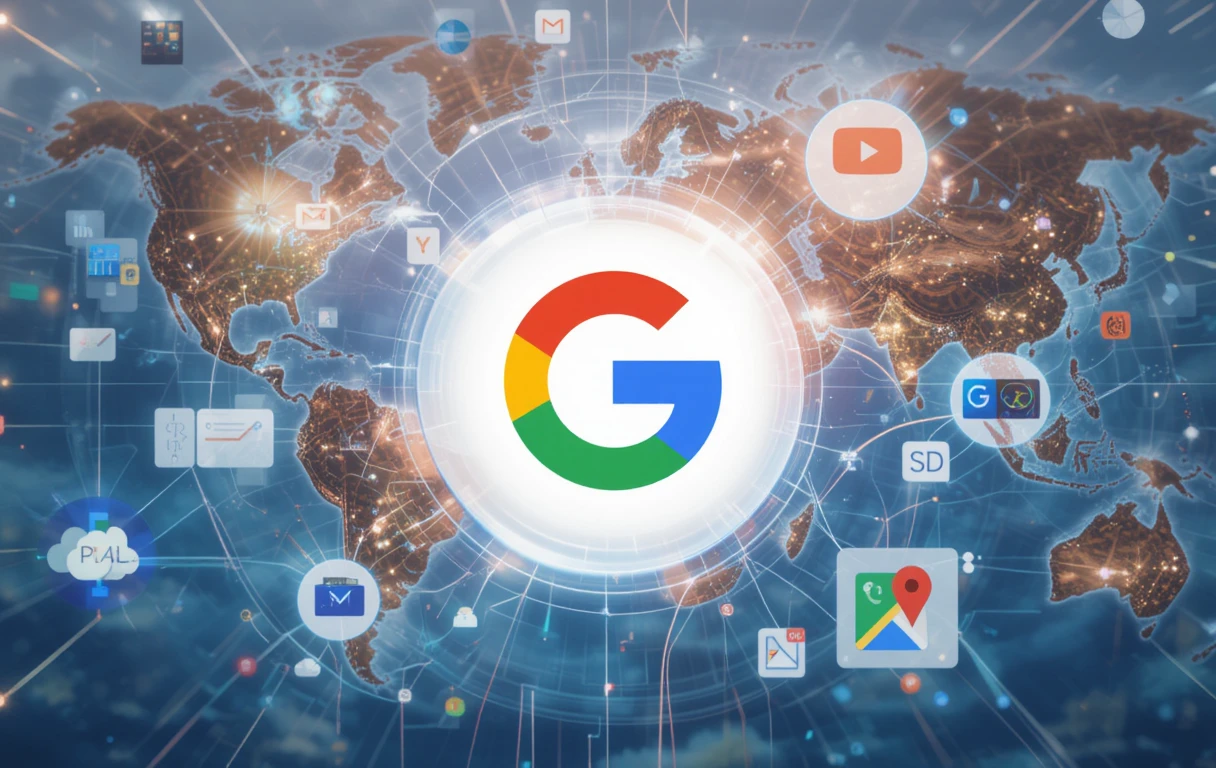Google, the tech giant we all rely on, has woven itself into nearly every aspect of our lives. From search engines to smart devices, Google’s ecosystem of services continues to grow, shaping the way we interact with technology, communicate, work, and even navigate the world. But as its presence expands, an inevitable question arises: Is Google taking over the world?
This question isn’t just about domination in tech but about how deeply Google influences our daily routines, decisions, and even our privacy. Let’s take an in-depth look at Google’s ecosystem, its global reach, and how it impacts nearly everything we do online—and offline.
The Powerhouse of Search: Google’s Core Mission
Google’s journey began as a search engine in 1998 with the simple mission of “organizing the world’s information and making it universally accessible and useful.” Fast forward to today, and Google commands over 91% of the global search engine market share (StatCounter, 2025).
Why does this matter? Search isn’t just about finding information anymore. Google has evolved its algorithms to not just deliver answers but to anticipate needs. With innovations like Google Knowledge Graph, Featured Snippets, and AI-driven search suggestions, Google has become a decision-making assistant for billions.
- The Impact on Information Access: Google essentially controls what information surfaces first for millions of search queries daily. This unparalleled influence makes it a powerful gatekeeper of information.
- SEO Dependency: For businesses, ranking high on Google search results can make or break their success. Entire industries now revolve around optimizing for Google’s search algorithms.
Google Services: An Ecosystem You Can’t Escape
One of the reasons it feels like Google is “taking over the world” is its integrated ecosystem. Here’s a quick breakdown of some of Google’s most popular services and their far-reaching impact.
Google Workspace (Formerly G Suite)
Google Workspace, featuring tools like Gmail, Google Drive, Docs, and Meet, dominates the workplace. Over 6 million businesses (Google, 2023) now rely on it for productivity and collaboration. Whether you’re drafting a document, sharing files, or holding virtual meetings, Google’s tools are embedded into everyday workflows.
- Why It Matters: Google Workspace’s cloud-based nature has made remote work and collaboration seamless, especially during and after the pandemic.
- Potential Concern: With so much dependency on Google Workspace, data centralization could raise privacy and security questions for organizations.
Android and Google Play Store
With Android powering 71% of the global smartphone market, Google has a significant foothold in mobile devices. The Google Play Store, housing millions of apps, ensures that Android users remain tethered to Google’s ecosystem.
- Monetization and Control: By controlling app distribution through its Play Store, Google takes a share of app developers’ revenue while also ensuring adherence to its policies.
Google Maps: Redefining Navigation
Google Maps isn’t just a tool for directions—it’s a dynamic platform for real-time traffic updates, local business reviews, and even augmented reality navigation.
- The Reach: Over 1 billion people use Google Maps monthly. Whether it’s finding the fastest route, locating a nearby restaurant, or even virtual sightseeing, Google Maps has become indispensable.
- Concern: The extensive tracking required to provide real-time data fuels debates over user privacy.
YouTube: Entertainment and Education in One Place
Owned by Google, YouTube has grown into the world’s second-most visited website (after Google Search). With over 2.5 billion monthly active users, it’s more than just a video platform—it’s a hub for creators, businesses, and advertisers.
- Ad Revenue Powerhouse: YouTube generated over $40 billion in ad revenue in 2023 alone.
- Cultural Impact: From educational tutorials to viral entertainment, YouTube has become a cornerstone of internet culture.
The Role of Artificial Intelligence in Google’s Expansion
Google is at the forefront of AI development. Tools like Google Bard, Google Lens, and Google Assistant showcase its push to integrate AI into daily life.
- Google Bard: Google’s AI chatbot competes directly with OpenAI’s ChatGPT, showcasing its ambition to dominate conversational AI.
- Google Assistant: With its integration into smart devices, Google Assistant is central to the future of smart homes and IoT.
- AI Ethics Debate: As Google’s AI capabilities grow, concerns about ethical use and data biases are intensifying.
The Dark Side of Google’s Global Influence
With great power comes great scrutiny. While Google provides unparalleled convenience, its dominance raises several red flags:
- Data Privacy: Google collects immense amounts of user data to personalize ads, which can feel invasive.
- Monopoly Concerns: Google has faced multiple antitrust lawsuits globally, with critics accusing it of stifling competition and innovation.
- Algorithmic Control: The way Google prioritizes content impacts not only businesses but also public opinion and knowledge access.
Is Google’s Dominance Unstoppable?
While Google’s dominance feels overwhelming, it’s not without competition. Rivals like Apple, Amazon, Microsoft, and Meta are constantly innovating to challenge Google’s stronghold. For instance:
- Microsoft’s Bing is making strides, particularly with its integration of OpenAI’s ChatGPT.
- Amazon Alexa is a major competitor in the smart assistant and IoT space.
However, Google’s ability to adapt and expand into new industries—like self-driving cars with Waymo and health tech with Verily—keeps it ahead of the curve.
The Future of Google: Global Impact or Overreach?
Google isn’t just a tech company—it’s a part of modern life. While its ecosystem offers convenience, efficiency, and innovation, it also raises ethical and practical questions. Is it taking over the world? Maybe. But perhaps the better question is: Do we want to live without Google?




